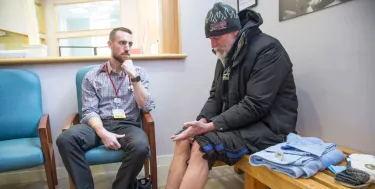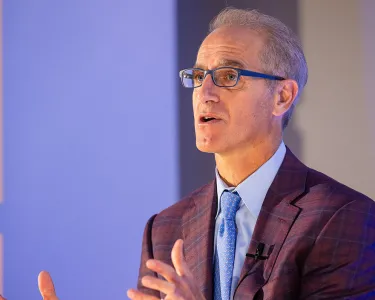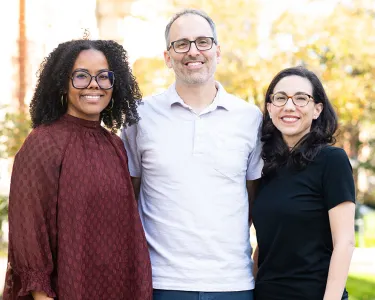Health Equity
From dental care to medical research to access to health care and good nutrition, Tufts researchers are working across disciplines and schools to address the many disparities that preclude everyone from achieving optimal health.
Improving Health Outcomes for All, Deeply Informed by Inequality's Contributing Factors

As defined by the Centers for Disease Control and Prevention, health equity is the state in which everyone has a fair and just opportunity to attain their highest level of health.
Committed to being part of the solution, numerous researchers across Tufts are actively engaged in the targeted and ongoing work required to surmount the societal and economic impediments to health and health care, to tackle past and current injustices, and to end preventable health disparities.
As selected examples of these efforts, drawn from around the university:
- The Center for Black Maternal Health and Reproductive Justice, founded at the School of Medicine by Okoro Professor of Black Maternal Health Ndidiamaka Amutah-Onukagha, with a vision of protecting the Black birthing experience through advocacy for quality, equitable, and respectful care in childbirth
- One of the first studies to explore the impact of Medicare Shared Savings Programs’ Accountable Care Organizations on mental health and addiction services and racial/ethnic disparities in care for these conditions
- A School of Medicine study of U.S. metropolitan areas over 40 years revealing strong links between residential segregation and disparities in early death rates from common causes, ranging from breast cancer to respiratory disease and firearm homicide
- A $2.7 million grant from the NIH to psychology researchers to map the pathways between experiencing racism-induced stress and developing disease
- The role of the Food is Medicine Institute in connecting the advocacy for a more nourishing, equitable, and sustainable food system with food’s powerful impact on health—including its potential to improve the lives of all
- The detailed map provided by a School of Engineering study to help target and prioritize equitable investments for climate change-resilient technology in the face of the disproportionate risk to minority and poor communities posed by decaying levees
- Research from the Friedman School about the impact of cross-sector coalitions in mitigating the early-childhood obesity epidemic—with concomitant implications for increased equity.
Numerous curricular offerings at schools across Tufts also help prepare future professionals to contribute as leaders in this work. As one example, Perspectives in Medicine—Patients, Populations, and Systems, is a course that spans the first three years of medical school for future physicians, with the aim of inspiring students to help reverse health disparities and contribute to systematic reform of health care. At the School of Dental Medicine, training at a local day program dedicated to improving quality of life for people living with HIV is a new addition to a unit focusing on care for vulnerable populations.
A range of related programs exist across Tufts as well, including, among others:
- The Community Service Learning program through the School of Medicine and Tisch College, which offers medical students opportunities for hands-on practice in treating the whole patient, taking into account the social and structural factors relevant to an individual’s health
- The Sam W. Ho Health Justice Scholars Program, which develops physician-leaders and scholars with the mission, vision, and ability to transform health care in partnership with communities, particularly those that are medically underserved
- The Civic Biology Fellowship, offering internships with organizations that support equity-based projects to position students well to collaborate with the communities they serve
- The Tufts Initiative in Civic Science, which confronts existing systemic and institutional barriers related to marginalization, and bias and exclusion on the basis of race, gender (identity and expression), ethnicity, ability, socioeconomic status, sexual orientation, age, and familial history of higher education
- A new School of Dental Medicine program teaches predoctoral students essential skills for treating people with complex medical conditions, social issues, or behavioral health needs while also identifying best practices for future use at Tufts Dental Facilities, a network of clinics for people with intellectual and developmental disabilities




